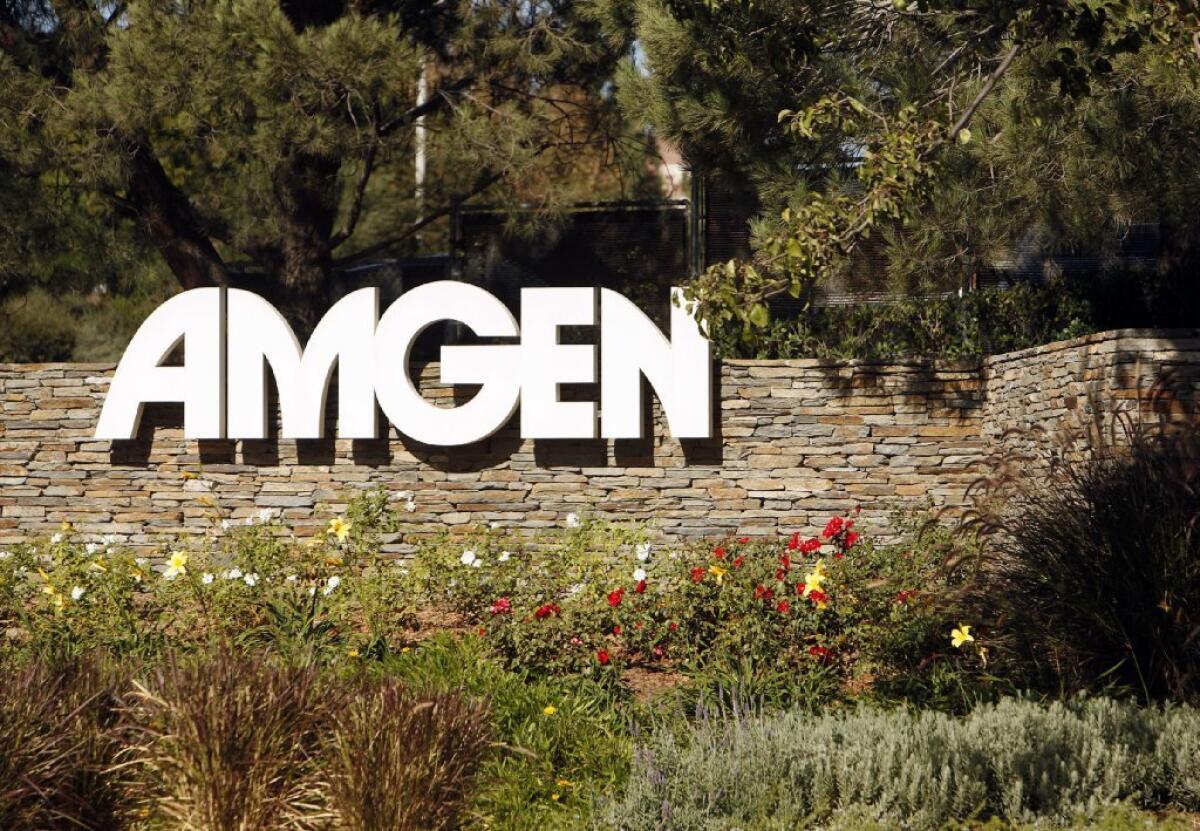Amgen to pay $71 million to states for promoting off-label drug uses

Amgen Inc., the Thousand Oaks biotech company, agreed Tuesday to pay $71 million to settle allegations by 48 states that the company improperly promoted off-label uses of two of its drugs.
Amgen Inc. has agreed to pay $71 million to settle allegations by 48 state attorneys general that it improperly marketed two of its blockbuster drugs.
The agreement announced Tuesday brings an end to a difficult chapter in the history of the Thousand Oaks biotech, which pleaded guilty in 2012 to a federal criminal charge related to similar allegations and paid $762 million in criminal penalties and civil settlements.
The states, including California, alleged that Amgen violated consumer protection laws by promoting the use of its anemia drug Aranesp for longer periods than the Food and Drug Administration had approved and by encouraging its use to treat anemia caused by cancer without FDA approval.
In addition, Amgen was accused of promoting its drug Enbrel as a treatment for mild plaque psoriasis even though it was approved only for severe plaque psoriasis, and for overstating the length of time that Enbrel effectively treats the disease.
Enbrel, with 2014 sales of $4.7 billion, and Aranesp, with sales of $1.9 billion, are two of Amgen’s top-selling drugs.
Three years ago, Amgen pleaded guilty to a single misdemeanor in federal court in New York for improperly marketing Aranesp. The drugmaker agreed to pay $150 million in criminal penalties and $612 million to resolve broader civil lawsuits, including allegations that Medicare, Medicaid and other government insurance programs were improperly billed.
At the time, federal prosecutors called the settlement “the single largest criminal and civil False Claims Act settlement involving a biotechnology company in U.S. history.”
Although doctors can prescribe medications for off-label uses, drug companies are banned from promoting uses that aren’t approved by the FDA, which has been at odds with some drugmakers over the issue.
Federal prosecutors said Amgen was “pursuing profits at the risk of patient safety” by encouraging doctors to prescribe Enbrel for unapproved uses to boost sales and take market share away from a rival drugmaker.
They also said the company encouraged doctors to prescribe Aranesp for patients with anemia caused by cancer, which the FDA had not approved and later determined increased the risk of death. The drug had been approved to treat anemia caused by chemotherapy.
The 2012 federal plea agreement followed 11 whistle-blower complaints.
Amgen issued a statement Tuesday that said it was “pleased to have this matter resolved.” The company did not admit or deny wrongdoing as part of the states’ settlement. The Aranesp-related conduct was from 2002 to 2007, while the Enbrel allegations involved conduct from 2004 to 2011.
“Amgen has a strong compliance program, and our management is dedicated to fostering a culture of doing the right thing at Amgen in full compliance with the law,” said the company, which adopted a new corporate integrity policy as part of its deal with the feds.
California will receive $4.6 million in the settlement.
“Amgen’s false marketing denied consumers the ability to make educated decisions about their healthcare,” said state Atty. Gen. Kamala Harris. “This settlement will hold the company accountable for its deceptive marketing and prevent it from using misleading practices in the future.”
New York Atty. Gen. Eric T. Schneiderman said in a statement that the settlement was important: “Consumers need to have confidence in the accuracy of claims made by pharmaceutical companies.”
Investors didn’t seem too interested in the news. Amgen shares fell $2.07, or 1.2%, to $167.72. The stock is up about 7% this year.
Eric Schmidt, a biotech analyst with Cowen & Co. investment bank in New York, said of the settlement: “We view this as a non-event for the stock.”
Twitter: @spfeifer22







